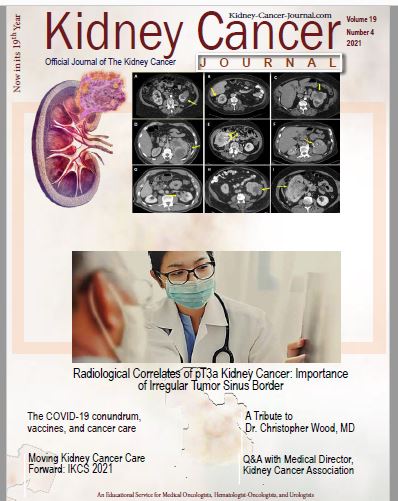Editor's Memo
The COVID-19 conundrum, vaccines, and cancer care

Robert A Figlin, MD
Correspondence to: Robert.Figlin@cshs.orgCedars-Sinai Samuel Oschin Comprehensive Cancer Institute, Cedars-Sinai Health System, Los Angeles, CA
Dear Colleagues,
As 2021 comes to an end while we are bracing for the second pandemic winter, the world faces a new COVID-19 variant Omicron. Like last year, this winter holiday season could turbo-charge COVID-19 spread. Given that Delta variant still has a lot more energy, newly found Omicron variant is adding another layer of uncertainty even among fully vaccinated people. The latest data from the KFF COVID-19 Vaccine Monitor indicates that one in four adults remain unvaccinated with one in seven (14%) continuing to say they will not get vaccinated1. We’re going to learn how long infection-induced and vaccination mediated protection last as time goes on. The global vaccine rollout wouldn’t guarantee cancer patients stay safe, but it would greatly limit the spread of the COVID and also offers reprieve for cancer patients.
Scientific conferences are crucial to keep abreast of the latest breakthroughs for physicians, HCPs, and caregivers etc. At the 2021 International Kidney Cancer Symposium (IKCS) held both in person in Austin Texas, and virtually from November 5th to 6th, oncologists and kidney cancer researchers around the world presented interesting latest research in kidney cancer care. Our IKCS21 conference supplement in this issue showcases advancements in renal oncology presented at the conference. Here is a recap of some interesting research presented at 2021 IKCS. Nizar Tannir MD, et al presented (abstract CTR11)2 the first long-term conditional survival data, representing the longest phase 3 follow-up (median, 67.7 months) reported for a checkpoint inhibitor combination therapy in aRCC from CheckMate 214 trial (NCT02231749). Results show that nivolumab plus ipilimumab yielded durable survival and response benefits relative to sunitinib in patients with advanced renal cell carcinoma (aRCC). In summary, nivolumab plus ipilimumab yielded durable survival and response benefits highlighted the greater likelihood of long-term clinical benefit relative to sunitinib in patients who had long-term survival. In the phase 3 study (abstract TIP01)3, S1931/PROBE (NCT04510597), authors hypothesized that in the setting of immune checkpoint based systemic therapy, cytoreductive nephrectomy may result in improvement in overall survival outcomes2. A post hoc exploratory analysis from CheckMate 9ER trial has shown that first-line NIVO+CABO demonstrated superiority versus SUN in aRCC patients in the phase 3 CheckMate 9ER trial (abstract CTR12) 4. In the phase 3 CheckMate 9ER trial (NCT03141177), exploratory analysis demonstrated N+C significantly improved progression-free survival (PFS), overall survival (OS), and objective response rate (ORR) vs S in first-line aRCC, irrespective of bone metastasis at baseline, consistent with outcomes in all randomized patients (abstract N22)5.
Also presented were some interesting results with the use of molecular biomarkers as predictors of response to treatment of kidney cancer. In a multi-institutional real-world study, using gene expression profiling, authors demonstrate differential GEP patterns among ccRCC and nccRCC tumors with nccRCC being strongly associated with the ‘proliferative’ subtype and angiogenic cluster would be sensitive to VEGF-TKI therapy combination (abstract N26)6. In the prognostic analysis (abstract LB47)7 using epithelialmesenchymal transition gene expression signature, authors observed EMT and CCP related pathways were enriched in patients with high WT1 expression cohort and the synergistic prognostic impact of EMT in tumors with high CCP score was observed with the potential to improve risk stratification. An ongoing phase 2 study (abstract TIP08)8, building on the findings from the phase III IMmotion151 trial (NCT02420821), investigates whether patients with clusters enriched in immunogenic/proliferative pathways will have improved outcomes with ipilimumab/nivolumab compared with the control group, and whether patients with angiogenic clusters will have improved outcomes with an immunotherapy/TKI combination compared with the control group.
The impact of COVID-19 vaccination in patients with renal cell carcinoma receiving cancer therapy were also presented. In a population of patients with RCC receiving ICI, COVID-19 vaccination appears to be well tolerated and safe (abstract N19)9. In another study (abstract E42)10, investigators demonstrated that sufficient immune response in RCC patients was observed in patients who received a commercially available COVID-19 vaccine and encourages continued vaccination among RCC patients.
In this issue, Ye et al reported that preoperative assessment of T3a RCC in absence of renal vein involvement or lymph node enlargement has potential implications for counseling and prognosis. This study suggests that ITSB and tumor-size associated with pT3a RCC, which could facilitate more accurate prediction of pT3a status and thus improve patient-counseling prior to surgery for RCC. This article is accompanied by a commentary written by Dr. Nirmish Singla. In the obituary section, Dr. Nizar Tannir paid a tribute to late Dr. Christopher Woods, a surgeon and professor at the University of Texas MD Anderson Cancer Center to recognize his contribution to the kidney cancer field. Dr Woods served as an editorial board member of our Kidney Cancer Journal and a chair of Board of Directors at the Kidney Cancer Association. In the IKCS 2021 supplement issue, Dr. Marc Matrana provided a conference coverage for IKCS 2021. For the top abstracts section, I have listed a few important abstracts presented at IKCS21 conference.
In closing, while vaccines give the best hope, newly emerging COVID-19 variants keep complicating our efforts to control the pandemic. It is not safe to let down our guard just yet. Hopefully, in the months to come, the rollout of vaccines worldwide would hit a sweet spot and the virus would get itself trapped. Fingers crossed, everyone. As we look ahead to 2022, we wish a healthy new year to you and your family despite these difficult times. We hope that the new year brings you and your family much happiness and prosperity, and that in time the world will be a safe place again.
Sincerely,
Robert A Figlin, MD



